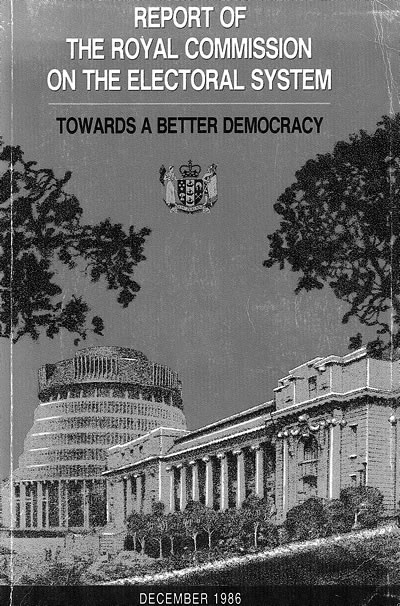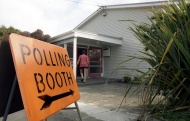Articles
The road to MMP

In 1993 New Zealanders voted to replace their traditional first past the post (FPP) voting system with mixed member proportional representation (MMP). Eighteen years on, as Kiwis voted in a new electoral referendum, we explore how and why that dramatic reform came about.
-
Page 2 – First past the post
From 1853 until 1993 (apart from 1908–13) New Zealand elections were held under the first past the post (FPP) or plurality system.
-
Page 3 – The Royal Commission
During the 1981 and 1984 campaigns, Labour promised to set up a Royal Commission to look into a wide range of issues relating to the electoral system.
-
Page 4 – Putting it to the vote
Although only 55% of electors took part in a referendum, an overwhelming 85% voted to change their electoral system. In the second part of the poll, 70% favoured mixed member
-
Page 5 – 1996 and beyond - the road to MMP
The three years following the 1993 referendum, before the first MMP election in 1996, were ones of transition and uncertainty.
-
Page 6 – Further information
Find out more about New Zealand's road to MMP.
The House of Representatives

New Zealand's Parliament dates back to 1854, just 14 years after the signing of the Treaty of Waitangi and the beginning of the European settlement of the country. For most of its history as a nation state, New Zealand has had some form of elected government.
- Page 4 - Doing businessThe operation of Parliament has changed over time as its workload has grown and new systems such as MMP have been implemented.
Television in New Zealand

New Zealand’s first non-experimental television transmission went to air on 1 June 1960. To mark five decades of TV, in 2010 we presented five snapshots of Kiwi TV history. Explore pre-1960 experiments, TV news, music shows and modern election coverage - and discover how our own history has been showcased on the small screen.
- Page 5 - Elections on TVIt took a while for television to make its mark on New Zealand elections, but since the 1980s the small screen has become the decisive election
Biographies
-
 Palmer, Geoffrey Winston
Palmer, Geoffrey Winston
Geoffrey Palmer, the hardworking, loyal deputy who became PM when David Lange resigned dramatically in August 1989, knew that Labour was doomed. ‘What I got from Lange was a hospital pass.’
Read more... -
 Bolger, James Brendan
Bolger, James Brendan
New Zealand’s most openly republican PM, Jim Bolger presided over major electoral reform and Treaty of Waitangi settlements and outflanked Cabinet opposition to funding the new national museum.
Read more...
-
Main image: Royal Commission on the Electoral System report
Cover of the 1986 Electoral Commission report.





